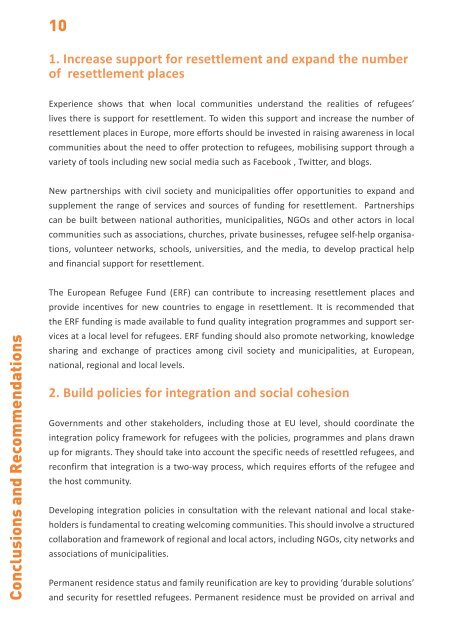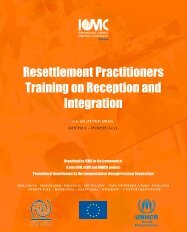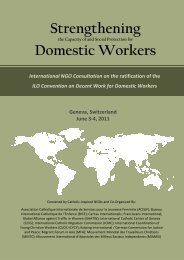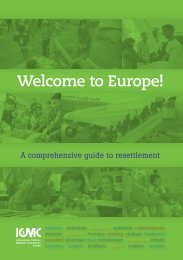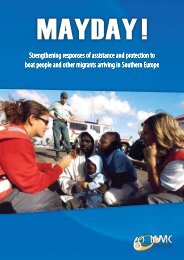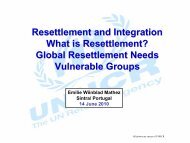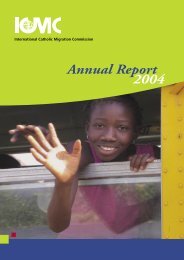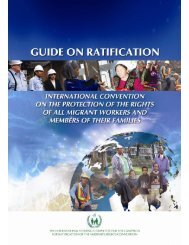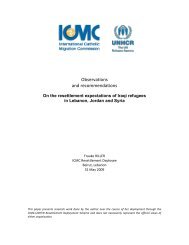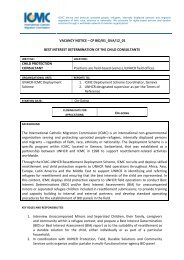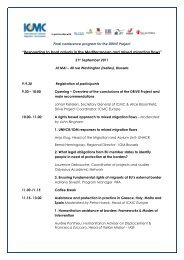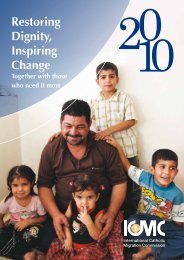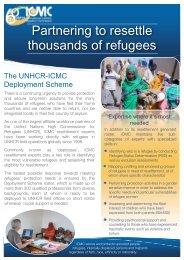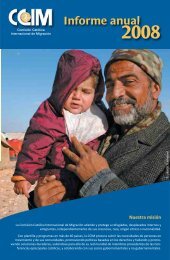'Paving the Way' Handbook - ICMC
'Paving the Way' Handbook - ICMC
'Paving the Way' Handbook - ICMC
Create successful ePaper yourself
Turn your PDF publications into a flip-book with our unique Google optimized e-Paper software.
10<br />
1. Increase support for resettlement and expand <strong>the</strong> number<br />
of resettlement places<br />
Experience shows that when local communities understand <strong>the</strong> realities of refugees’<br />
lives <strong>the</strong>re is support for resettlement. To widen this support and increase <strong>the</strong> number of<br />
resettlement places in Europe, more efforts should be invested in raising awareness in local<br />
communities about <strong>the</strong> need to offer protection to refugees, mobilising support through a<br />
variety of tools including new social media such as Facebook , Twitter, and blogs.<br />
New partnerships with civil society and municipalities offer opportunities to expand and<br />
supplement <strong>the</strong> range of services and sources of funding for resettlement. Partnerships<br />
can be built between national authorities, municipalities, NGOs and o<strong>the</strong>r actors in local<br />
communities such as associations, churches, private businesses, refugee self-help organisations,<br />
volunteer networks, schools, universities, and <strong>the</strong> media, to develop practical help<br />
and financial support for resettlement.<br />
Conclusions and Recommendations<br />
The European Refugee Fund (ERF) can contribute to increasing resettlement places and<br />
provide incentives for new countries to engage in resettlement. It is recommended that<br />
<strong>the</strong> ERF funding is made available to fund quality integration programmes and support services<br />
at a local level for refugees. ERF funding should also promote networking, knowledge<br />
sharing and exchange of practices among civil society and municipalities, at European,<br />
national, regional and local levels.<br />
2. Build policies for integration and social cohesion<br />
Governments and o<strong>the</strong>r stakeholders, including those at EU level, should coordinate <strong>the</strong><br />
integration policy framework for refugees with <strong>the</strong> policies, programmes and plans drawn<br />
up for migrants. They should take into account <strong>the</strong> specific needs of resettled refugees, and<br />
reconfirm that integration is a two-way process, which requires efforts of <strong>the</strong> refugee and<br />
<strong>the</strong> host community.<br />
Developing integration policies in consultation with <strong>the</strong> relevant national and local stakeholders<br />
is fundamental to creating welcoming communities. This should involve a structured<br />
collaboration and framework of regional and local actors, including NGOs, city networks and<br />
associations of municipalities.<br />
Permanent residence status and family reunification are key to providing ‘durable solutions’<br />
and security for resettled refugees. Permanent residence must be provided on arrival and


